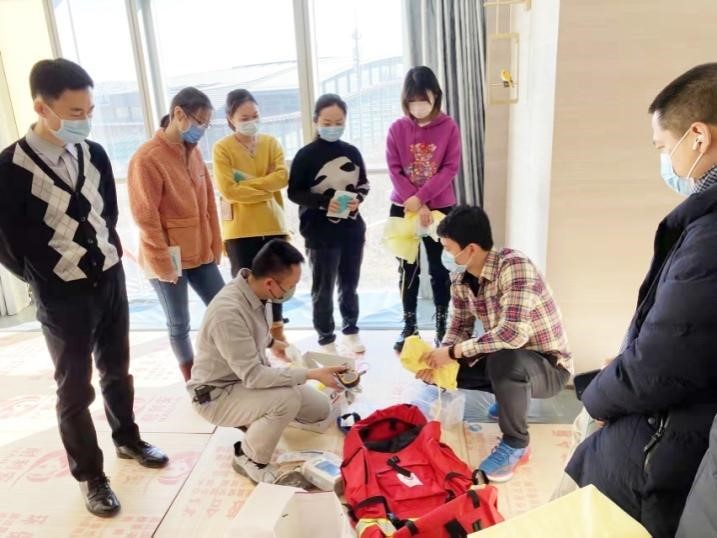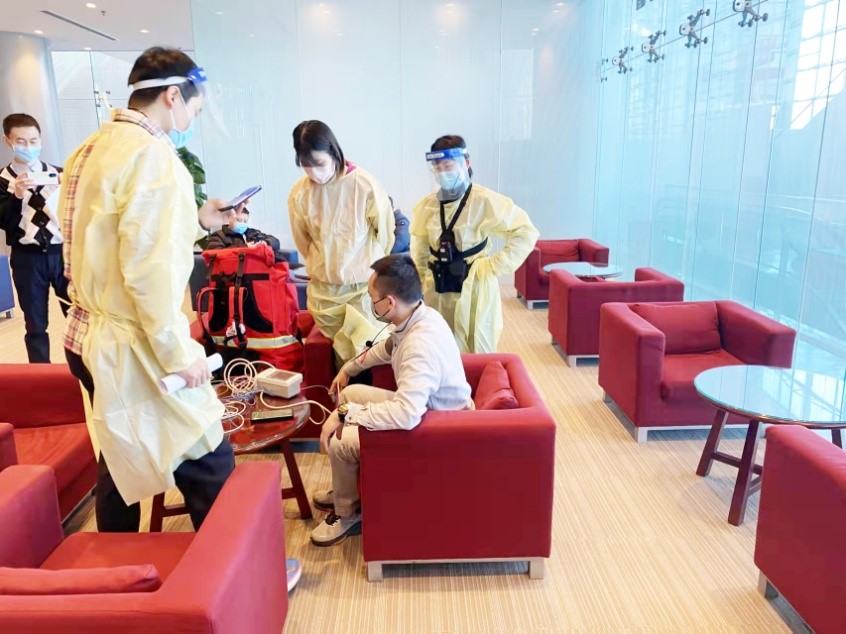Assignment
At the beginning of 2022, I had the most extraordinary experience in my life, which is unique in that it is about providing medical services on the basis of meeting epidemic prevention and control requirements, all in the closed loop. Since the moment I got the assignment, I have been busy either answering test questions online or trying to find the answers, acquiring and absorbing the knowledge about the Winter Olympics at an incredibly fast pace. With all-round skills improvement, we are fully confident in providing high-quality services to the Winter Olympics.
Scheduling difficulty
As the Winter Olympics approached, my original work schedule was disrupted by the intensive collective medical training and drills of the Winter Olympics. Totally supportive, the Department of Emergency had the general scheduler arrange for me a three-week flexible scheduling period by piecing together different chunks of time.
See-off
On the afternoon of January 22, riding in my electric bike unsteadily under the weight of my heavy luggage, I arrived at the gathering spot at the hospital, only to find that it was already packed with leaders who were there to see us off. Braving the freezing cold and the rare snow of Beijing, they helped us organize luggage and arrange seating and told us to come back from the assignment safely and triumphantly. The chants “best wishes for the Winter Olympics and together for a shared future” reverberated throughout PUMCH.
The bus taking us skillfully navigated the busy traffic on the ring roads of Beijing. The assignment of providing medical services in the closed loop made us both nervous and excited. We are nervous because what await us are a work environment, model and groups of people that are all unfamiliar to us and the tasks of quickly building medical service units that could meet the requirements of epidemic prevention and control and handle various emergencies. What is exciting is that we are the medical service personnel of the Winter Olympics in Beijing, the first city to host both the Summer and Winter Olympics Games in the world, which fills us with tremendous honor and pride.
Entry into the closed loop
Soon we arrived at the closed-loop entrance, and it only took us 20 minutes from check-in to signing the letter of commitment. After that, we immediately started to work on building the medical service stations. Everyone was working energetically and relentlessly, each contributing in his or her own way, ideas or actions. Finally, the messy “warehouses” were turned into well-organized medical service stations.
Routine tasks
I was on the day shift on January 23. Before seven o’clock in the morning, medical officer Chen Gang and I already started the planning and arrangement of another medical service station. Watching the hand sanitizer dispenser and UV lamps installed by us put into use gave me a sense of accomplishment. The assiduous and beautiful nurse Wang Sinong took stock of the medicines and soon we saw a medicine cabinet with drugs in all categories and neatly arranged, which is an indispensable tool for us to meet all kinds of medical challenges.
Soon, the medical service station received its first patient, a security guard in his fifties who felt dizzy and weak. I inquired in detail about his past and present medical records and did a physical examination, and after confirming that there was no potential risk, I prescribed the corresponding medicine for him. Later, I followed up on his case and learned that his symptoms were relieved, which made us all very happy. Given the particular way things work in the closed loop, accurate and specific patient information are not accessible to us. Instead, we can only rely on careful physical examination and experience to rule out greater risks and determine whether a patient needs referral. This is a test for every member of the medical teams.
In the early morning of January 24, a cleaning lady came to the medical service station. Her hand was accidentally squeezed while she was doing cleaning and bled profusely. The initial diagnosis was a fracture of the little finger and an open laceration. Fan Junping, associate professor of the Department of Respiratory, skillfully applied direct pressure to stop the bleeding and quickly disinfected and dressed the wound.
After a while, the phone rang, and an armed police officer made an appointment for dental care. Although toothache is a minor problem, it is somewhat risky for a medical service station in the closed loop. A mistake, however slight it is, may lead to deterioration or even serious problems such as interstitial infection and endocarditis. I carefully examined the young soldier and made sure that there was no obvious redness, swelling or pus before prescribing ibuprofen and metronidazole; I told him to pay attention to oral hygiene, eat more fresh fruits and vegetables, improve his immunity, and make follow-up visits at any change of his conditions.
The closed loop of the Winter Olympics, packed with all kinds of staff members, is like a miniature society where each performs his or her own duties. But here, unlike the Department of Emergency where things move at a fast pace, we need to spot the potential problems of each patient and properly carry out prevention and education to ensure that the Winter Olympics proceeds smoothly at every node along the way.
Spot check
On January 28, I was on day shift. After completing daily tasks such as disinfection, cleaning, sorting, and handover one by one, and then receiving two patients, the doorbell rang again. When I opened the door, I was greeted politely by two medical officers of the Olympic Committee. They came this time to get a clear idea about the diagnosis and treatment process at the medical service station and to check if emergency medical services run smoothly.
Looking at the proper zoning of the medical service station and the complete equipment for diagnosis, treatment and rescue in place, they marveled that “it is not easy to build such a well-functioning medical service station in such a short period of time”. They couldn’t help but try the equipment, as if itching to join us. These lovely medical officers are a case in point of the “healthcare without borders” tenet. Indeed, we all harbor the same aspiration and dream - to contribute to a smooth-running global sports event! Near noon, the taller one of those medical officers brought an Arab medical assistant who is proficient in multiple languages and has a medical background and he can be there for patients in need throughout the process.
The Olympic Games brings together athletes from all over the world, and medicine connects doctors from all over the world, and all medical professionals fulfill the “Hippocratic Oath” in a way that transcends borders and without reservation.

Liu Anlei (the second from right) was receiving field emergency care training outside the hospital

Simulation of emergency medical care
Written by and photo courtesy of Liu Anlei, Department of Emergency
Translator: Liu Haiyan
Editor: Wang Yao
